
This post comes in response to a request for advice from a friend I'll call Mr X.
Hi CC, I’d like some advice if you have any.
I’m reviewing a XXX concert here in London in a fortnight and they need photos. Any advice for concert shooting? My lens can only get down to f4.5 and built in flash only. It’s not ideal gear but it’s what I have to work with so any thoughts you have would be greatly appreciated.
Mr X.
Hi Mr X,
My first advice is more about the shoot than the shooting. Do all your homework first. Scout the venue beforehand, make absolutely sure everyone you need knows what you're doing and talk to as many of them as possible: Promoter, band, manager, venue owner, sound guy, lighting guy, security, and any other media. Make sure they're going to play ball with your plan. It's easy for a venue manager to miss briefing security properly, resulting in you missing out on access. I once nearly had my arm broken by George Thoroughood's bouncer for trying to talk to him without an appointment - and I was part of the warmup act! Talking to everyone also gives you a chance to ask more questions, sus out the best vantage points etc. Pro concert shooters are often limited to shooting just the first 3 songs, and flash photography can also be an issue. You need to be on top of all this.
Now lets talk pictures. The pictures you get could just be the difference between a) getting a gig for Rolling Stone or b) stacking shelves for the rest of your life. For the band, it could be the difference between c) Looking like hardworking professional musicians riding a rocket to the top or d) a bunch of drugged-out crims who just 'found' a van full of musical instruments. Everyone wants you to make the best pictures you can.
OK, to the hardware. I'm not a gear snob. I think you can make good pictures with just about any camera if you have a little know-how, but you are up against a number of limitations with what you have. I just don't think an f4.5 lens is going to be up to the job in concert lighting without really cranking your ISO up well past 1600. On-board flash, even on a high-end DSLR is kind of impotent in a concert setting.
If that is really your only option for a camera, my best advice is to hunt flickr and local camera groups for someone keen with all the gear who will do the shots for free. There'll be dozens leaping at the chance. I think you'll get your best result that way, and you'll be free to concentrate on your review. Much lower stress levels, and you'll make a good future contact.
If the picture credit is important to you, (and why wouldn't it be?) I suggest you borrow or hire gear that's going to guarantee you some good shots with the greatest of ease, and the easiest way is to get a camera with a fast lens that will make good pictures with the ambient lighting. It should be easy to find reasonable camera hire in London. Sounds like you could get away with a prosumer DSLR and fast lens to do low light non-flash stuff I recommend something like the Canon 450 D and the cheap 50mm f/1.8II lens. The 450 only has an ISO of 1600, but with steady hands, you'll be able to get some good pictures - of course if you can get a better camera and faster lens for a good deal, take them. These are examples of what the 450D and 50mm 1.8II can do:


If flash is permissible, then I'd include a strong dedicated flash to give some variety to the shots. Whatever you decide to use, make sure you know the gear and are ready to use it.
If you decide to stick with what you've got, you've got some challenges to overcome, but that's not to say you won't get some useful shots. Get out to some pub gigs and practice until you can get consistently good stuff. Without knowing more about your setup, here's what you might find:
Live setting: Stage lights, moving performers. Flash off. You crank up your light sensitivity (ISO) as far as it goes - maybe 1600, possibly 6400. You probably know that's going to risk some noise in your images, but that's not the biggest worry. I reckon your shutter speed is going to be so slow that you'll get a lot of blur, both from camera shake and the moving performers. You might shoot at slow speed from a tripod, in which case you'll get a nice sharp stage and light rig but blurry performers. And it's not easy to wrangle a tripod in the mosh pit. Not ideal. But there's a glimmer of good news. If your writing is good, blurry impressionistic shots might get by, but I don't recommend it.

OK, now lest see what your options are with flash activated - if they let you use flash. On board camera flash usually has an effective range of 3-5m. Is that going to be enough? Everything out of range will be dark, except maybe for the lights. That lighting will be fairly unflattering too, possibly including redeye. You'll get stuff looking like party snaps.
Your other option is to use your flash and drag the shutter.



I don't know what your camera calls this setting, it might be night portrait or slow sync. Or you could put your camera into manual mode, set your aperture and exposure for the ambient light and use the flash as well, you'll get the same effect. The camera will attempt to get the best exposure for the ambient light, giving you a long shutter speed and blurry images, but it will also fire the flash, lighting and freezing the subject. The result will be a trippy looking combination of sharp subject overlaying subject and background blur. This can work OK for rock shooting. In this mode you'll get something useful. Again, experiment with the technique first. Actually rotate the camera or zoom with your feet during the exposure to make some blurred light trails and you'll come up with some good creative stuff. As you can see, you risk the drugged-out crim look with this technique. This may please some bands.

We haven't even talked about how to use a dedicated flash if you decided to go that way, or coverage - what to shoot, but this could turn into a very long discussion. If you've access to the band, try to get some shots of them before or after the gig too, and if I'd try to tell the story of the gig by shooting offstage stuff too: punters, lighting and sound, setup, soundcheck. That's where a good dedicated shooter can come in handy while you concentrate on the journalism.


Best of luck Mr X, and I look forward to seeing your review.
Have you got a favourite band or concert shooting tip? Don't be shy to share it with us.

No comments:
Post a Comment